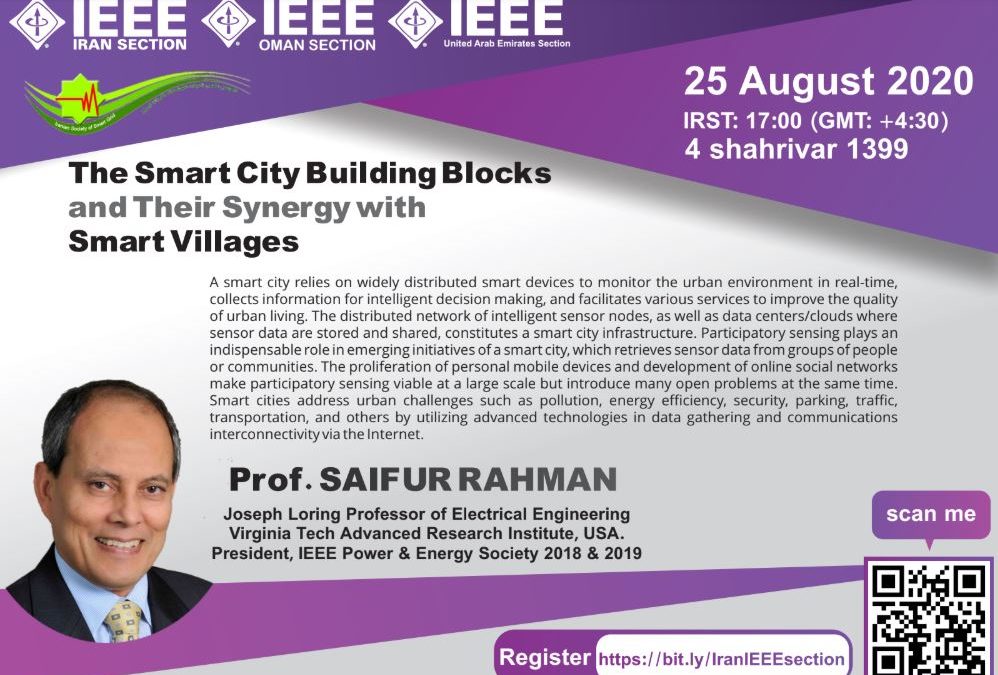IEEE Iran Section continues its webinar series, examining the smart city building blocks and their synergy with smart villages.
The webinar series is free, co-organized with the IEEE Sections of UAE and Oman, and is open to anyone to register. Additionally, the option of a certificate is available during the registration, for those willing or interested to have one.
A few details about the topic
A smart city relies on widely distributed smart devices to monitor the urban environment in real-time, collects information for intelligent decision making, and facilitates various services to improve the quality of urban living. The distributed network of intelligent sensor nodes, as well as data centers/clouds where sensor data are stored and shared, constitutes a smart city infrastructure. Participatory sensing plays an indispensable role in emerging initiatives of a smart city, which retrieves sensor data from groups of people or communities. The proliferation of personal mobile devices and development of online social networks make participatory sensing viable at a large scale but introduce many open problems at the same time.
Smart cities address urban challenges such as pollution, energy efficiency, security, parking, traffic, transportation, and others by utilizing advanced technologies in data gathering and communications interconnectivity via the Internet. It provides real time and remote monitoring for different aspects of data management in areas such as transportation, communication, video surveillance, and sensors distributed throughout the city. Simultaneously, the Smart City building blocks like education, telemedicine, health care, IT applications, pollution management, etc. can be deployed in Smart Village initiatives to have a greater impact on the rural population throughout the world. This will support the world’s energy-impoverished communities by providing a comprehensive solution combining renewable energy, community-based education, and entrepreneurial opportunities through reliable electricity and internet connectivity.
About the speaker
Professor Saifur Rahman is the founding director of the Advanced Research Institute at Virginia Tech, USA where he is the Joseph R. Loring professor of electrical and computer engineering. He also directs the Center for Energy and the Global Environment. He is a Life Fellow of the IEEE and an IEEE Millennium Medal winner. He was the president of the IEEE Power and Energy Society (PES) for 2018 and 2019. He was the founding editor-in-chief of the IEEE Electrification Magazine and the IEEE Transactions on Sustainable Energy. He has published over 140 journal papers and has made over four hundred conference and invited presentations. In 2006 he served on the IEEE Board of Directors as the vice president for publications.
He is a distinguished lecturer for the IEEE Power & Energy Society and has lectured on renewable energy, energy efficiency, smart grid, energy internet, blockchain, IoT sensor integration, etc. in over 30 countries. He is the founder of BEM Controls, LLC, a Virginia (USA)-based software company providing building energy management solutions. He served as the chair of the US National Science Foundation Advisory Committee for International Science and Engineering from 2010 to 2013. He has conducted several energy efficiencies, blockchain and sensor integration projects for Duke Energy, Tokyo Electric Power Company, the US National Science Foundation, the US Department of Defense, the US Department of Energy and the State of Virginia. He has a PhD in electrical engineering from Virginia Tech.
Interested to participate in this free webinar? Register at https://bit.ly/IranIEEEsection


Social Media